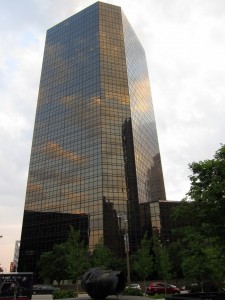Meet the protesters of Occupy St. Louis – October 14, 2011
I occasionally listen to Rush Limbaugh's radio show because I consider it important to understand how it is that my views differ from those of people who oppose my views. Two days ago, I listened to Limbaugh bloviating about the people who are participating in the Occupy Protests springing up all over the United States. By some reports, there are more than 1,000 such protests ongoing, and they are actually occurring all over the world. Limbaugh announced, without hesitation, that these protesters are mostly unemployed, lazy, dirty, amoral, socially irresponsible and ignorant young people. Those who rely on Rush Limbaugh for their facts might thus be highly likely to object to these protests (including Occupy Wall Street) based on Limbaugh's description of the protesters. But is the description he gave to his many (though dwindling number of) listeners accurate? I had an opportunity to check this yesterday at the Occupy St. Louis protest in my hometown of St. Louis, Missouri.
Over the past few days, I've been quite occupied at my day job, and it was only while walking back to my law office from the federal courthouse at 4 pm yesterday that I spotted an organized march coming down Market Street in downtown St. Louis. I would estimate that there were almost 1,000 people marching. I didn't have my video camera with me, but I did have my Canon S95 pocket camera, so I got to work taking hand-held video and still shots of the protesters. Here's the finished product, which will allow you to actually meet the types of people who are participating in the Saint Louis Occupy protest. You can now be your own judge of what these protesters are like:
As you can see from the parade route pans and the interviews, none of these people fit the description given by Rush Limbaugh. Off camera, I asked most of the protesters about their "day jobs," and all of them indicated that they were gainfully employed, and in a wide variety of challenging fields. These "young" protesters of Occupy St. Louis ranged in age from 20's to their 80's. The on-camera statements of the people I interviewed show that they are well-informed, thoughtful, highly articulate and good-hearted. Many of the people I spoke with indicated that they are not going away. They have been waiting for a good time and place to express their deep concerns about the way our government works, and they have finally found what they've been looking for.
 In case anyone is concerned that I intentionally skewed my sampling regarding who I interviewed, this was my method: I simply walked up to someone nearby and asked whether he or she would be willing to give a short statement about why they were attending the protest. I approached 12 people. One woman sympathetic to the protest apologized and said she couldn't talk on camera because she was a member of the news media. One man said that he supported the protest, but he'd rather not go on camera. Another man said he had never been part of a protest before, but he read about this protest recently and then said to himself, "Yeah, these people are right on these issues." The other nine people I approached agreed to give statements on camera. I'd like to thank each of these folks for taking the time to talk (I've listed their names in the order in which they appear in my video):
In case anyone is concerned that I intentionally skewed my sampling regarding who I interviewed, this was my method: I simply walked up to someone nearby and asked whether he or she would be willing to give a short statement about why they were attending the protest. I approached 12 people. One woman sympathetic to the protest apologized and said she couldn't talk on camera because she was a member of the news media. One man said that he supported the protest, but he'd rather not go on camera. Another man said he had never been part of a protest before, but he read about this protest recently and then said to himself, "Yeah, these people are right on these issues." The other nine people I approached agreed to give statements on camera. I'd like to thank each of these folks for taking the time to talk (I've listed their names in the order in which they appear in my video):
- Al Vitale
- Fred Raines (a retired economics professor, who said that he compiled the statistics displayed on one of the signs appearing on the video)
- Apollonia Childs
- Chrissy Kirchhoefer
- Curtis Roberts
- Michel Kiepe
- Jeff Schaefer
- Matt Ankney, and
- Frances Madeson

